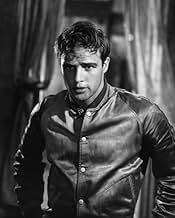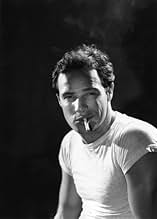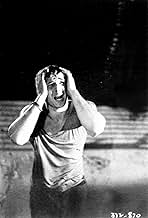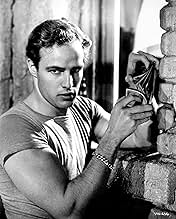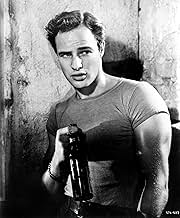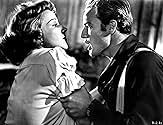Blanche DuBois, psychologiquement fragile, emménage chez sa soeur à La Nouvelle-Orléans et est tourmentée par son beau-frère brutal alors que tout s'effondre autour d'elle.Blanche DuBois, psychologiquement fragile, emménage chez sa soeur à La Nouvelle-Orléans et est tourmentée par son beau-frère brutal alors que tout s'effondre autour d'elle.Blanche DuBois, psychologiquement fragile, emménage chez sa soeur à La Nouvelle-Orléans et est tourmentée par son beau-frère brutal alors que tout s'effondre autour d'elle.
- Récompensé par 4 Oscars
- 18 victoires et 15 nominations au total
James Adamson
- Extra
- (non crédité)
Irene Allen
- Extra
- (non crédité)
Mel Archer
- Foreman
- (non crédité)
Walter Bacon
- Club Patron
- (non crédité)
Dahn Ben Amotz
- Minor Role
- (non crédité)
Histoire
Le saviez-vous
- AnecdotesAs the film progresses, the set of the Kowalski apartment actually gets smaller to heighten the suggestion of Blanche's increasing claustrophobia.
- GaffesWhen Stanley comes back from taking Stella to the hospital, he is looking for a bottle opener. He finds it on the mantelpiece, shakes up a bottle of beer, and opens it. The beer foams up and spills on his trousers. But if you watch at the moment when he swings himself up to sit on the table - before he opens the bottle - you can see that the front of his trousers are already wet. Apparently they re-shot it without him changing into dry trousers.
- Versions alternativesThe scene in which Blanche and Stanley first meet was edited a bit to take out some of the sexual tension that both had towards each other when the film was first released in 1951. In 1993, this footage was restored in the "Original Director's Version" of the film. The three minutes of newly-added footage sticks out from the rest of the film because Warner Brothers did not bother to restore these extra film elements along with the rest of the movie, leaving them very scratchy due to deterioration.
- ConnexionsEdited into Un Américain nommé Kazan (2018)
- Bandes originalesIt's Only a Paper Moon
(1933) (uncredited)
Music by Harold Arlen
Lyrics by E.Y. Harburg and Billy Rose
Sung by Vivien Leigh while doing her hair
Commentaire à la une
With a screenplay by Tennessee Williams, direction from Elia Kazan and quite possibly the greatest performance ever in Vivien Leigh's Blanche DuBois- you can't go wrong.
This movie is dark, gritty and, at times, disturbing in its portrayals of domestic abuse and mental illness. It's astonishing how much of a punch this movie still has after all these years. This just goes to show what a true genius Tennessee Williams really was. The characters he wrote, with all their own complexities and contradictions, and the script with its haunting poetry and now iconic lines are all classic.
But what good is a great script without great actors? Well, luckily, the cast couldn't have been better. Here we have a young Marlon Brando as the brutish Stanley Kowalski, who is truly ferocious in the role. We then have Kim Hunter who gives a great performance as the weak-willed Stella. Stella is the most likeable character in the movie for all she wants is for everyone to get along. Karl Malden is equally great as Mitch, who is seemingly weak and simple and serves as a contrast to Stanley's brutality. Then we have Vivien Leigh as Blanche DuBois. As I said above, I believe Leigh's performance here to be the greatest ever to be committed to film and here's why- Blanche DuBois is probably one of the most complicated characters ever written. She's a compulsive liar, who lives in a world of her own, choosing to create her own reality rather than acknowledge her bleak surroundings. She's a snob, a hypocrite and a user but at the same time she's an underdog who's had a tough life and just wants to be loved. Tennessee Williams himself said of Vivien's performance that 'she brought everything I intended to the role and even much more than I had dared dream of' which pretty much sums up her performance here. She truly gives herself to the darkness of Blanche DuBois, she's unpredictable, tormented and haunting while still somehow sympathetic. Through Leigh's mastery of her character we see that Blanche is really just a daffodil in a windstorm rather than a bad person. Every time I watch this film I notice a new nuance in her performance, whether it's a look in her eye that I hadn't noticed before or a change in her voice as Blanche lets her mask slip- never has there been such a true embodiment of a character.
So all this considered, with Kazan's brilliant direction, great cinematography and the unique "jazzy" score, is why I consider 'A Streetcar Named Desire' one of the greatest films ever made. It's not a film for everyone- it's heavy from the start, it's quite talky and most of the film takes place within the Kowalski's apartment but if you want a movie with brilliant acting and a dark, poetic script then there's no better film than this.
This movie is dark, gritty and, at times, disturbing in its portrayals of domestic abuse and mental illness. It's astonishing how much of a punch this movie still has after all these years. This just goes to show what a true genius Tennessee Williams really was. The characters he wrote, with all their own complexities and contradictions, and the script with its haunting poetry and now iconic lines are all classic.
But what good is a great script without great actors? Well, luckily, the cast couldn't have been better. Here we have a young Marlon Brando as the brutish Stanley Kowalski, who is truly ferocious in the role. We then have Kim Hunter who gives a great performance as the weak-willed Stella. Stella is the most likeable character in the movie for all she wants is for everyone to get along. Karl Malden is equally great as Mitch, who is seemingly weak and simple and serves as a contrast to Stanley's brutality. Then we have Vivien Leigh as Blanche DuBois. As I said above, I believe Leigh's performance here to be the greatest ever to be committed to film and here's why- Blanche DuBois is probably one of the most complicated characters ever written. She's a compulsive liar, who lives in a world of her own, choosing to create her own reality rather than acknowledge her bleak surroundings. She's a snob, a hypocrite and a user but at the same time she's an underdog who's had a tough life and just wants to be loved. Tennessee Williams himself said of Vivien's performance that 'she brought everything I intended to the role and even much more than I had dared dream of' which pretty much sums up her performance here. She truly gives herself to the darkness of Blanche DuBois, she's unpredictable, tormented and haunting while still somehow sympathetic. Through Leigh's mastery of her character we see that Blanche is really just a daffodil in a windstorm rather than a bad person. Every time I watch this film I notice a new nuance in her performance, whether it's a look in her eye that I hadn't noticed before or a change in her voice as Blanche lets her mask slip- never has there been such a true embodiment of a character.
So all this considered, with Kazan's brilliant direction, great cinematography and the unique "jazzy" score, is why I consider 'A Streetcar Named Desire' one of the greatest films ever made. It's not a film for everyone- it's heavy from the start, it's quite talky and most of the film takes place within the Kowalski's apartment but if you want a movie with brilliant acting and a dark, poetic script then there's no better film than this.
- callandobs
- 8 mars 2018
- Permalien
Meilleurs choix
Connectez-vous pour évaluer et suivre la liste de favoris afin de recevoir des recommandations personnalisées
Détails
- Date de sortie
- Pays d’origine
- Langues
- Aussi connu sous le nom de
- Un tranvía llamado Deseo
- Lieux de tournage
- Nouvelle-Orléans, Louisiane, États-Unis(railway station)
- Sociétés de production
- Voir plus de crédits d'entreprise sur IMDbPro
Box-office
- Budget
- 1 800 000 $US (estimé)
- Montant brut mondial
- 53 162 $US
- Durée2 heures 2 minutes
- Couleur
- Rapport de forme
- 1.37 : 1
Contribuer à cette page
Suggérer une modification ou ajouter du contenu manquant

Lacune principale
What was the official certification given to Un tramway nommé désir (1951) in Japan?
Répondre






